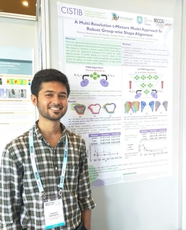
Nishant Ravikumar Ph.D.
Alumnus of the Pattern Recognition Lab of the Friedrich-Alexander-Universität Erlangen-Nürnberg
Nishant Ravikumar is a post-doc at LME. His research interests include medical image registration, segmentation and classification using machine learning/deep learning, for computer-aided diagnosis and interventions. His current project is 'BIG-THERA: Multi-scale, multi-modal analysis for improved diagnosis and treatment of breast cancer'.
Breast cancer is the leading cause of cancer related deaths in women, the second most common cancer worldwide. The development and progression of breast cancer is a dynamic biological and evolutionary process. It involves a composite organ system, with transcriptome shaped by gene aberrations, epigenetic changes, the cellular biological context, and environmental influences. Breast cancer growth and response to treatment has a number of characteristics that are specific to the individual patient, for example the response of the immune system and the interaction with the neighboring tissue. The overall complexity of breast cancer is the main cause for the current, unsatisfying understanding of its development and the patient’s therapy response. Although recent precision medicine approaches, including genomic characterization and immunotherapies, have shown clear improvements with regard to prognosis, the right treatment of this disease remains a serious challenge. The vision of the BIG-THERA team is to improve individualized breast cancer diagnostics and therapy, with the ultimate goal of extending the life expectancy of breast cancer sufferers. Our primary contribution in this regard is developing a multi-modal, multi-scale framework for the early diagnosis of the molecular sub-types of breast cancer, in a manner that supplements the clinical diagnostic workflow and enables the early identification of patients compatible with specific immunotherapeutic solutions.

 +49 9131 85 27774
+49 9131 85 27774
 +49 9131 85 27270
+49 9131 85 27270

